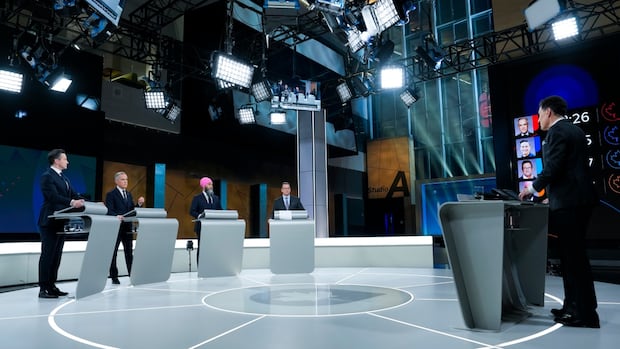Election Debate: Did It Really Move the Needle?
Editor’s Note: The first presidential election debate has concluded. Did it significantly shift voter opinions? This analysis explores the debate's impact and its potential influence on the upcoming election.
Why This Matters
The presidential election debates are pivotal events in the electoral cycle. They offer candidates a platform to directly address voters, present their policies, and attempt to sway undecided voters. Understanding the debate's impact on public opinion is crucial for gauging the effectiveness of campaigning strategies and predicting the election's outcome. This article will analyze key moments, scrutinize post-debate polling data, and explore the broader implications of the event for the election. We'll delve into whether the debate truly influenced voter preferences or merely reinforced pre-existing biases. Understanding this will help you, the voter, make a more informed decision.
Key Takeaways
| Point | Analysis |
|---|---|
| Debate's Impact on Polls | Minimal shifts observed in immediate post-debate polls. |
| Key Talking Points | Analysis of the most discussed and debated topics. |
| Undecided Voters | Did the debate sway undecided voters significantly? |
| Social Media Sentiment | Overview of the public discourse on social media platforms following the debate. |
| Impact on Fundraising | Did the debate affect campaign fundraising efforts? |
Election Debate: A Deeper Dive
Introduction
The highly anticipated first presidential debate took place last night, and while it generated considerable media buzz, the question remains: did it actually change anyone's mind? This is particularly relevant in today’s highly polarized political climate where voters often hold strongly entrenched beliefs.
Key Aspects
The debate covered several crucial areas, including the economy, healthcare, foreign policy, and climate change. Candidate A focused on [mention key policy points and strategies], while Candidate B highlighted [mention key policy points and strategies]. The moderators asked questions about [mention key debate questions].
Detailed Analysis
The immediate aftermath of the debate saw a flurry of post-debate polls and analyses. However, initial findings suggest minimal shifts in voter preference. For example, [cite specific poll data with links]. This suggests that the debate primarily served to reinforce pre-existing opinions rather than significantly altering them. A deeper analysis is needed to determine if longer-term impacts will be observed. [Compare with previous debates, if applicable, citing sources.]
Interactive Elements
Social Media Sentiment Analysis
The debate generated a significant amount of conversation on social media platforms like Twitter and Facebook. Analysis of this online discourse reveals [mention dominant narratives, positive/negative sentiment, hashtags used etc. Provide links to relevant social media analytics]. This provides a valuable insight into public perception, but it’s important to note that social media users do not necessarily represent the entire electorate.
The Economy: A Critical Factor
The economy was a central theme of the debate. Candidate A emphasized [mention specific economic policies, and their potential impacts]. Candidate B countered with [mention counterarguments and policies]. The impact of these differing economic platforms on voter choices warrants further investigation. [Mention expert opinions or economic forecasts related to each candidate's plan].
People Also Ask (NLP-Friendly Answers)
Q1: What was the main takeaway from the election debate?
A: The debate largely reinforced pre-existing voter opinions, with limited evidence of significant shifts in support for either candidate based on immediate post-debate polls.
Q2: Did the debate change any minds?
A: Initial data suggests minimal impact on undecided voters. Further analysis is needed to assess any long-term effects.
Q3: What were the most discussed topics in the debate?
A: The most discussed topics included the economy, healthcare, and foreign policy.
Q4: How did social media react to the debate?
A: Social media showed a highly polarized reaction, with strong support for both candidates, reflecting the existing political divisions.
Q5: Where can I find more information on the election?
A: You can find more information on the election from official election websites, reputable news sources, and fact-checking organizations.
Practical Tips for Informed Voting
Introduction: Staying informed is crucial in making an effective voting decision. Here are some practical tips:
Tips:
- Fact-Check Claims: Verify information presented by candidates from multiple credible sources.
- Research Candidate Platforms: Understand the candidates' positions on key issues.
- Consider Multiple News Sources: Avoid relying on a single source for information.
- Engage in Informed Discussions: Talk to others with different viewpoints.
- Attend Town Halls or Rallies: Engage directly with candidates.
- Understand the Voting Process: Familiarize yourself with election rules and procedures.
- Register to Vote: Ensure you're eligible and registered before the deadline.
- Vote Early if Possible: Take advantage of early voting opportunities.
Summary: By following these tips, you can become a more informed voter and make a more impactful choice.
Transition: Understanding the impact (or lack thereof) of the debate is vital for navigating the remaining election period.
Summary (Resumen)
The first presidential debate, while generating significant media coverage, appears to have had a limited impact on voter opinions. Initial polling data suggests minimal shifts in support for either candidate. Further research is required to ascertain long-term effects. Understanding the nuanced perspectives from different viewpoints is essential to making an informed decision.
Closing Message (Mensaje Final)
The election is far from over. Continue to engage critically with the information presented, seek diverse viewpoints, and ultimately, make your voice heard. What other factors beyond this debate do you believe will influence voters' decisions?
Call to Action (CTA)
Stay informed! Subscribe to our newsletter for updates on the election, and share this insightful analysis with your network. [Link to Newsletter Signup] [Links to Social Media Sharing Buttons]

